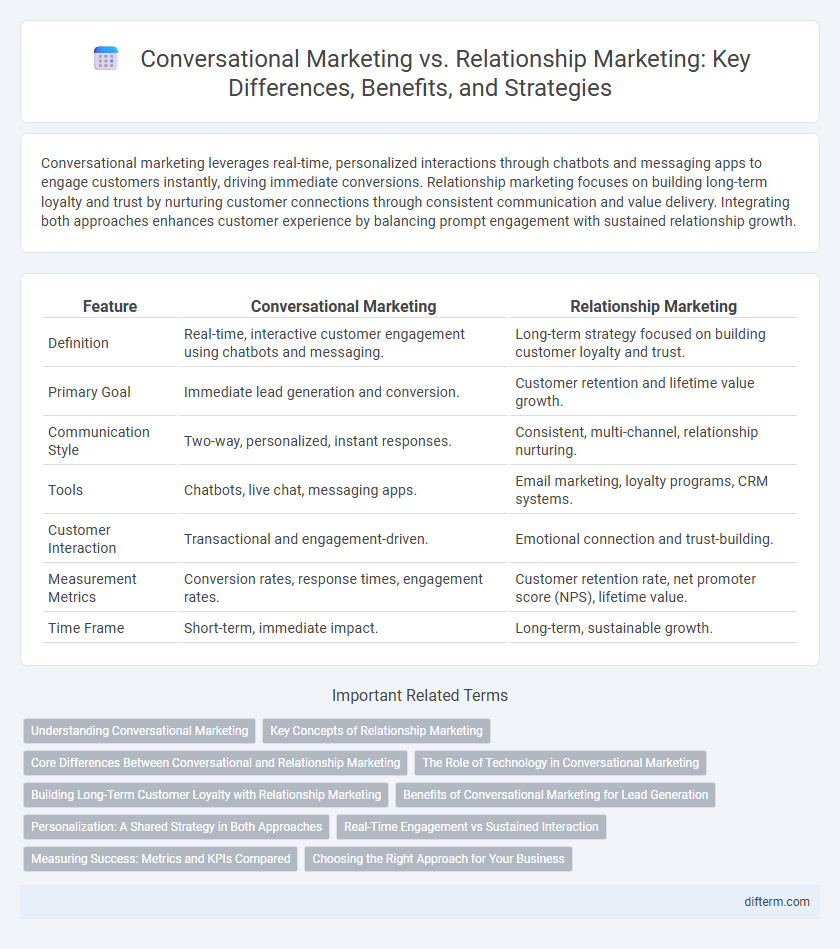Conversational marketing leverages real-time, personalized interactions through chatbots and messaging apps to engage customers instantly, driving immediate conversions. Relationship marketing focuses on building long-term loyalty and trust by nurturing customer connections through consistent communication and value delivery. Integrating both approaches enhances customer experience by balancing prompt engagement with sustained relationship growth.
Table of Comparison
| Feature | Conversational Marketing | Relationship Marketing |
|---|---|---|
| Definition | Real-time, interactive customer engagement using chatbots and messaging. | Long-term strategy focused on building customer loyalty and trust. |
| Primary Goal | Immediate lead generation and conversion. | Customer retention and lifetime value growth. |
| Communication Style | Two-way, personalized, instant responses. | Consistent, multi-channel, relationship nurturing. |
| Tools | Chatbots, live chat, messaging apps. | Email marketing, loyalty programs, CRM systems. |
| Customer Interaction | Transactional and engagement-driven. | Emotional connection and trust-building. |
| Measurement Metrics | Conversion rates, response times, engagement rates. | Customer retention rate, net promoter score (NPS), lifetime value. |
| Time Frame | Short-term, immediate impact. | Long-term, sustainable growth. |
Understanding Conversational Marketing
Conversational Marketing leverages real-time, personalized interactions through chatbots, messaging apps, and social media to engage customers instantly and drive immediate action. This approach prioritizes two-way communication, enhancing customer experience by addressing individual needs and reducing sales cycle length. Understanding Conversational Marketing involves recognizing its ability to capture leads more effectively and foster dynamic dialogue compared to traditional Relationship Marketing, which centers on long-term customer loyalty through consistent brand engagement.
Key Concepts of Relationship Marketing
Relationship marketing emphasizes building long-term customer loyalty through personalized communication, trust, and consistent engagement. Key concepts include customer retention, multisensory brand experiences, and emotional connection to foster ongoing commitment. This approach contrasts with conversational marketing's focus on real-time interactions and immediate conversion.
Core Differences Between Conversational and Relationship Marketing
Conversational marketing centers on real-time, personalized interactions between brands and customers through chatbots, messaging apps, or live chats to drive immediate engagement and quick conversions. Relationship marketing focuses on building long-term customer loyalty and trust by nurturing ongoing communication, value delivery, and emotional connections over time. The core difference lies in conversational marketing's emphasis on instant, interactive dialogue versus relationship marketing's strategy of sustained connection and customer retention.
The Role of Technology in Conversational Marketing
Conversational marketing leverages AI-powered chatbots and real-time messaging platforms to deliver personalized customer interactions and immediate responses, significantly enhancing user engagement. Advanced natural language processing (NLP) and data analytics enable brands to tailor conversations based on individual preferences and behaviors. This integration of technology streamlines lead generation and nurtures customer journeys more efficiently compared to traditional relationship marketing methods.
Building Long-Term Customer Loyalty with Relationship Marketing
Relationship marketing focuses on cultivating long-term customer loyalty by fostering consistent, personalized interactions that deepen trust and brand affinity. Conversational marketing drives immediate engagement through real-time dialogues, but relationship marketing builds sustained value by integrating data-driven insights to tailor ongoing customer experiences. Brands leveraging relationship marketing strategies often see higher customer retention rates and lifetime value compared to purely transactional conversational approaches.
Benefits of Conversational Marketing for Lead Generation
Conversational marketing accelerates lead generation by enabling real-time, personalized interactions that capture prospects' attention and address their specific needs instantly. This approach fosters immediate engagement through chatbots and live messaging, increasing conversion rates by guiding leads seamlessly through the sales funnel. Unlike relationship marketing, which focuses on long-term brand loyalty, conversational marketing delivers measurable, rapid lead acquisition results critical for scaling sales efforts efficiently.
Personalization: A Shared Strategy in Both Approaches
Conversational marketing and relationship marketing both leverage personalization as a core strategy to engage customers more effectively. By tailoring messages and interactions based on individual preferences and behaviors, these approaches enhance customer experience and foster loyalty. Data-driven insights power this personalization, enabling marketers to deliver relevant content that resonates deeply with each audience segment.
Real-Time Engagement vs Sustained Interaction
Conversational marketing emphasizes real-time engagement through instant messaging, chatbots, and live interactions that capture customer attention and drive immediate responses. Relationship marketing prioritizes sustained interaction by building long-term trust and loyalty via personalized communication, consistent follow-ups, and value-driven content. Both strategies leverage customer insights but differ in timing, with conversational marketing optimizing spontaneity and relationship marketing nurturing ongoing connections.
Measuring Success: Metrics and KPIs Compared
Conversational marketing success is primarily measured through real-time engagement metrics such as response time, chat conversion rate, and customer satisfaction scores, reflecting immediate interaction effectiveness. Relationship marketing emphasizes long-term KPIs like customer lifetime value (CLV), retention rate, and net promoter score (NPS) to gauge ongoing loyalty and brand affinity. Combining both approaches offers a comprehensive understanding of marketing impact by balancing instant communication metrics with enduring relationship indicators.
Choosing the Right Approach for Your Business
Conversational marketing emphasizes real-time, personalized interactions through chatbots and live messaging, driving immediate customer engagement and faster conversions. Relationship marketing concentrates on building long-term customer loyalty and trust through consistent value and personalized communication over time. Selecting the right approach depends on business goals, target audience behavior, and whether the priority is rapid lead generation or sustained customer retention.
Conversational Marketing vs Relationship Marketing Infographic

 difterm.com
difterm.com